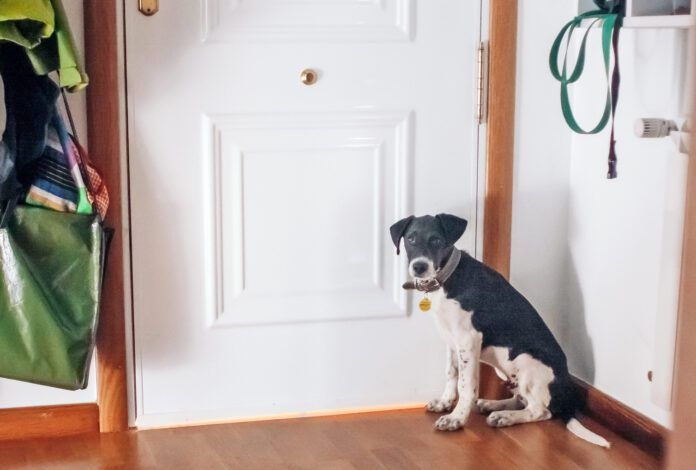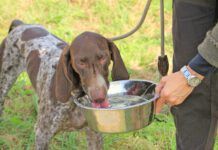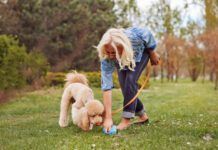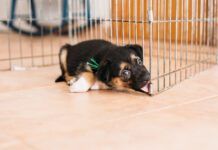Many adult rescue and shelter dogs are listed as potty trained. But, in fairness to the shelter, it can be difficult to ascertain whether a dog is truly potty trained in a shelter environment. Some shelters are well-staffed, but others aren’t, which makes regular potty breaks difficult. It can be easier in a foster home, but not always. So, adopting a dog that is having potty accidents happens, but it’s not the worst thing—it is usually relatively easy to potty train an older dog if you know how. You only need to get your dog on a suitable routine for that is appropriate for them and fits your own schedule. Dogs love routines and respond well to predictability.
How To Potty Train an Older Dog
Potty training an older dog, whether due to potty-training regression or no training at all, is like potty training a puppy. The difference is that adult dogs have the physical ability to hold their elimination needs considerably longer than puppies. They may not know that, though, so you can help them learn. However, working with an older dog who has more bladder control doesn’t mean that you can fast forward through the typical stages of potty training a dog. Consistent, methodical training is how you get a potty-trained dog regardless of age. Here are the steps:
- The usual protocol is to take your dog out first thing in the morning (before you do anything else aside from maybe a bathroom trip yourself) and actively supervise the dog. Bring treats so you can immediately reward the dog for an elimination. Be as enthusiastic as the dog’s temperament can allows once elimination occurs. Sound happy, even softly happy. I name the outings for pottying needs, as in announcing, “Let’s go potty!” This works toward the future goal of having a dog who eliminates promptly and without getting too distracted. An additional reward for fast elimination can include a sniffari in the yard or a walk afterward. My preference is getting down to business first.
- You may need to take your dog out again after breakfast. Meals should be at specific time frames/situational time frames, versus free feeding, to best determine bowel elimination needs. Each dog is different with how long they may need to eliminate after a meal. The age of the dog is also important as younger dogs process food much more quickly in general. So, if you’re potty training an older dog you have a little bit more leeway, but when the dog starts sniffing the floor after meals, that is the cue to take them out just in case. My motto is, “When in doubt, take them out.”
- Active supervision. Taking them out every few hours is a good general rule for adult potty training but, again, active supervision on your part when your dog is awake and mobile means that you are more likely to get them outside before they sneak off and you find a surprise.
- Crating your new dog when home alone helps prevent accidents. But keep in mind that no dog should be left crated for lengthy periods. If you work outside of the home for a regular business day, then please consider a midday potty break courtesy of a dog walker/pet sitter.
- The last potty of the day should be right before heading to bed, regardless of where your dog will sleep. Ideally, they will be sleeping in an area near enough to you that you may hear them whine in the middle of the night if they have to potty then.
- Night Location. The dog’s overnight accommodation should be thought out with the possibility that if they are confined in some way, they will be unlikely to eliminate where they are sleeping. That can mean a crate, but it can also mean an ex-pen, preferably near where you sleep for both easy bonding as well as being within hearing range.
Every dog parent always wants to teach their dog to tell them that they need to go outside to potty. The thing is that your dog will develop their own “tell.” It’s up to you to be observant enough to notice what that is. The most common ones are walking to the door that is used most frequently for exiting to potty, coming up to you and staring at you, barking at a door, barking at you, and looking at you and then in the direction of the door. Dogs that have not been potty trained may not yet know what their “tell” is, but they will develop one. You need to look for it.
How to Deal With Puppy Potty Training Regression
If you’ve adopted a puppy who might have only been partially potty trained, just stick with the same above routine suggestions but add this step: When your puppy is playing heavily, they may simply stop playing and pee right where they are. This is perfectly normal, so don’t be alarmed or yell at them. Plan for this in future play sessions. Teach a take a break somewhere midway through the usual length of a play session to go out for a potty attempt. This will help your older puppy remember that telling you during play is the same as telling you at any other time.
It is also normal that an older puppy who gave you the impression that they were solidly potty-trained starts having accidents again somewhere around 7 months of age. That seems to be the common time frame where potty regressions can regularly occur. Just go back to basics as a refresher. Consistency and observation skills truly are your friends in a solid potty-training plan. Please don’t give up on your dog because of potty training regressions. This truly is the easiest issue to resolve.
Other Factors That Affect Potty Training an Older Dog
That said, if you’ve tried the usual potty-training protocols and your older dog is still eliminating in the house, there may be a behavioral and health-related issue complicating things. For example, medical conditions, such as urinary tract infections (UTIs), can keep a dog from being able to make it outside. If potty training issues persist, it’s worth getting your dog checked by a vet to make sure health problems aren’t a factor.
On the behavioral side, stress and anxiety can also make it difficult—even impossible—for a dog to keep control of their bladder and may even cause gastrointestinal distress that leads to accidents in the house. If no medicals issues have been found, but your dog is still struggling, it may be time to consult with a good fear-free trainer or behaviorist.







Isnt there also the possibility of an older dog developing a UTI due to urine retention if they were potty trained and then tried to hold it as long as possible before soiling indoors if they were in a shelter or situation where they couldn’t go outside when needed? I with think that is worth a mention if frequent accidents are happening despite training.